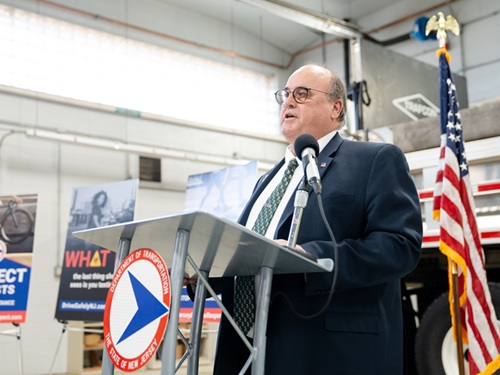The New Jersey Department of Transportation recently opened the grant solicitation period for its Local Bridges Fund program for fiscal 2025, with applications accepted through February 4, 2025.
[Above photo by New Jersey DOT]
The Local Bridges Fund is a $44 million program funded through the New Jersey Transportation Trust Fund, which provides funding for each of New Jersey’s 21 counties for the improvement of county bridges.

Every county receives $1 million, with additional funding allotted based on a formula that takes into account the total bridge deck area in each county as well as the amount of bridge deck area in poor condition county-wide as well.
Fran O’Connor, commissioner of the New Jersey DOT, added that, as part of the agency’s Statewide Capital Investment Strategy, those grants are intended to help counties focus on the bridges within their jurisdiction with the greatest structural deficiencies.
“The Local Bridges Fund provides counties with the financial assistance needed to make critical improvements to bridges under their jurisdiction,” he explained in a statement. “This program improves local infrastructure, helping make Governor [Phil] Murphy’s commitment to a safe, efficient, and equitable transportation system a reality for everyone who travels through New Jersey.”
[Editor’s note: The New Jersey DOT also operates a laboratory dedicated to testing a variety of steel products used in the construction of bridges in the state.]
State departments of transportation across the country help local infrastructure projects in a variety of ways.
For example, the Michigan Department of Transportation recently held an event with the City of Sandusky to celebrate the reopening of M-46 and M-19 roadways, which support commercial, commuter, and tourism traffic for that municipality.
This $26.4 million project included rebuilding M-46, replacing storm sewers, upgrading traffic signals, replacing curbs, upgrading sidewalks, and safety improvements, as well as improving M-19.

Concurrently, Governor Tony Evers (D) and the Wisconsin Department of Transportation recently awarded a $500,000 Transportation Economic Assistance or TEA grant to the city of Milton to help improve 2,700 feet of Vickerman Road to increase vehicle accessibility and allow material science company Charter Next Generation to add a second facility in the city.
Wisconsin DOT added that the project will widen Vickerman Road to allow for safe and efficient truck access to the new facility. The road improvements will also enhance accessibility for businesses and increase capacity to accommodate further growth and development to the area.
Meantime, the Massachusetts Department of Transportation recently awarded more than $4.5 million to 11 municipalities as part of the first round of fiscal year 2025 grants via its Complete Streets Funding Program.
The agency said that those grants will fund local multimodal infrastructure projects that improve travel for pedestrians, public transit users, bicyclists and people using other forms of transportation.
MassDOT added that its Complete Streets Funding Program – launched in 2016 – provides technical assistance and construction funding to eligible municipalities to plan and implement Complete Streets. Prior to this round of disbursements, the program had awarded 278 construction project grants across the state worth more than $100 million in total.
Also, the Ohio Department of Transportation also recently issued $63 million to projects aimed at improving roadway safety at the local level across 14 counties, along with more than $12 million to help fix or replace several local bridges.
That $63 million, issued from Ohio DOT’s Highway Safety Improvement Program, will support 19 safety projects, including the construction of a dozen roundabouts and the installation of several cable barriers.
And in October, Alabama Governor Kay Ivey (R) awarded $3.1 million in state funding to cities and counties statewide to support various road and bridge projects; funding that comes from the Rebuild Alabama Act passed by the state legislature and signed by the governor in 2019.
The Rebuild Alabama Act required the Alabama Department of Transportation to establish an annual road funding grant program that sets aside a minimum of $10 million off the top of the state’s share of new fuel tax revenue for local projects.
 States
States
Georgia DOT Foreman Receives Two Heroism Awards
January 2, 2026 States
States

